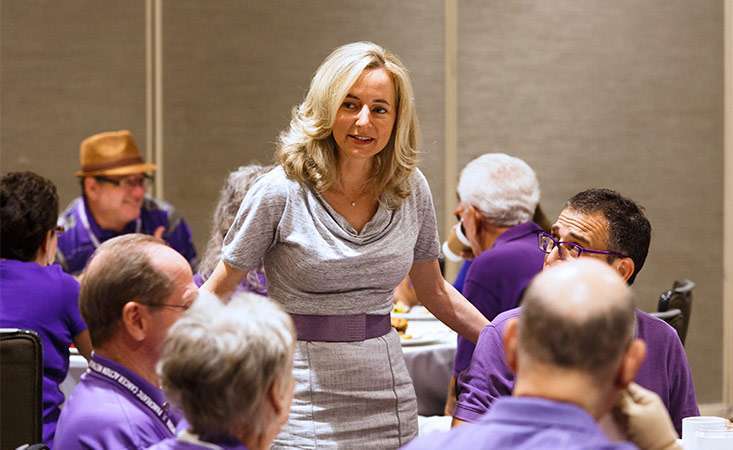
Julie Fleshman, JD, MBA and President and CEO of the Pancreatic Cancer Action Network
Editor’s note: Julie Fleshman, JD, MBA, is the president and CEO of the Pancreatic Cancer Action Network (PanCAN). Under her leadership, PanCAN has grown from a staff of one with revenues of $228,000 to a staff of over 140 with a budget of more than $36 million.
After nearly 20 years of advocating for research, funding and awareness for the world’s toughest cancer – pancreatic cancer – I became the patient this past August.
But I didn’t hear the words, “You have pancreatic cancer.” I was diagnosed with early stage breast cancer (DCIS) after a routine mammogram at the age of 43.
I consider myself extremely fortunate.
Fortunate because with this early-stage diagnosis, I was given options, including surgery that left me cancer-free. That’s a term many patients with advanced forms of cancers aren’t usually afforded.
This experience has given me such immense gratitude for all the breast cancer advocates who came before me and who paved the way for effective treatment options and a method to find the disease early.
It has also given me an even deeper appreciation for our work at PanCAN and the incredibly dedicated volunteers and advocates who work tirelessly to create a better future for pancreatic cancer patients.
I joined the fight against pancreatic cancer because my dad died from the disease just four months after he was diagnosed. He had no options and no hope. I was mad and determined to change that experience for future patients.
Hired as PanCAN’s first full-time employee, I took that anger and channeled it into doing good, building programs and services for pancreatic cancer patients and advancing research efforts.
But none of that prepared me for becoming the patient.
I’m used to being in control, serving as a leader and sounding board for staff and our community. After I received my diagnosis, nothing could have equipped me for being handed an educational booklet about breast cancer, speaking with my surgeon for the first time, or meeting with a radiation oncologist to learn more about my treatment options.
Within a flash, I was sitting on the other side of the table with a completely different perspective and suddenly I was the one who needed to be embraced. I have heard people say that their cancer diagnosis was a gift, and now I understand why – my family, friends and colleagues showed me immense love and support, providing me the opportunity to realize tremendous gratitude for all the people in my life.
I will always stand in awe of the pink pioneers who have paved the way – and how their advocacy efforts directly benefited me. Still, I remain steadfast in my mission to ensure the world sees purple, the color that symbolizes pancreatic cancer.
Everyone fighting pancreatic cancer desperately deserves more options and hope. Pancreatic cancer is the third-leading cause of cancer death in the U.S. and in less than two years, is projected to become the second. The five-year survival rate for the disease is just 9 percent. The disease continues to claim the lives of legends like Aretha Franklin, Patrick Swayze, Alan Rickman and others.
There is an urgent need for an early detection method and better treatment options for the more than 55,000 mothers, fathers, husbands, wives, sisters, brothers, colleagues and friends who will be diagnosed with pancreatic cancer this year.
The pancreatic cancer community is committed and passionate, but we need many more advocates.
In today’s fast-paced and complex world, volunteerism and philanthropy are more important than ever. Every day, I witness the awe-inspiring work of people that have been touched by pancreatic cancer and the impact it has not only on our community, but also the opportunity it gives them to champion a cause. I whole heartedly believe we can improve survival for this disease.
I urge you to get involved in your community. Become an advocate. Donate. You never know when you may become the one in need and how much you will wish that someone had stood up and acted before you.















